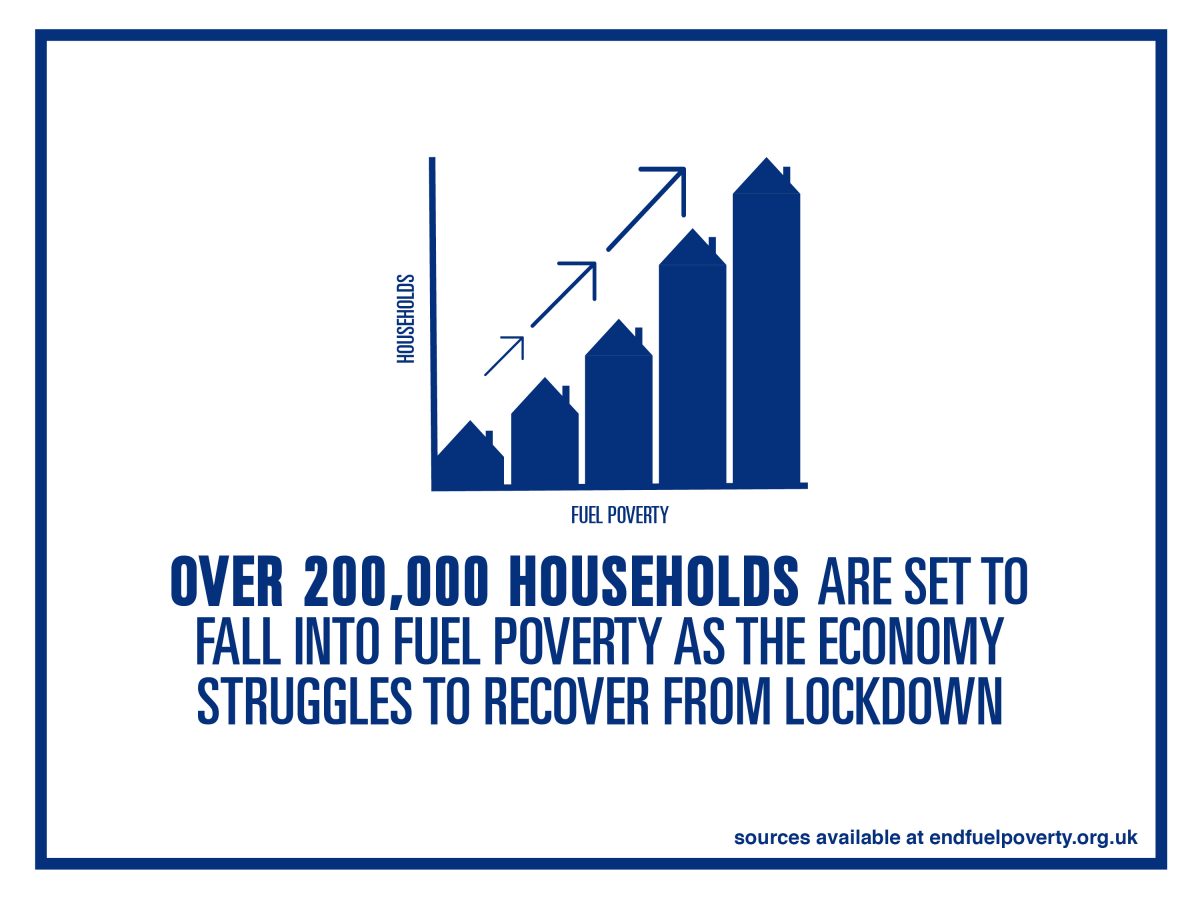Over 200,000 households are set to fall into fuel poverty as the economy struggles to recover from lockdown, according to new estimates. [1]
The End Fuel Poverty Coalition is warning that as the numbers in fuel poverty soar, a future wave of COVID-19 striking during colder weather could be catastrophic for individuals and health services.
Public Health England have declared that there is “clear evidence on the links between cold temperatures and respiratory problems. Resistance to respiratory infections is lowered by cool temperatures and can increase the risk of respiratory illness.” [2]
The Coalition has launched a petition calling on the government to build on announcements in the Economic Statement and take urgent action to save lives and help address the financial impact of the current crisis.
Fuel poverty is caused by low income, high fuel prices, poor energy efficiency, unaffordable housing and poor quality private rental housing. At least 2.4m households in England are already in fuel poverty, affecting 10% of the population. [3]
William Baker, from Solutions to Tackle Energy Poverty and member of the Coalition, commented:
It has never been more important for the government to fix the roof while the sun is shining.
While it is summer now, colder temperatures are on the way and hundreds of thousands more people will feel the harsh reality of fuel poverty. In just a few months we could see a perfect storm of cold homes, high winter fuel bills and a future wave of COVID-19 hitting the NHS during winter – a period when it always struggles to maintain services.
The Coalition wrote to the Prime Minister on 23 June setting out four steps for the government to take to tackle fuel poverty before the winter.
The Chancellor’s Economic Statement of 8 July introduced partial measures to help improve energy efficiency, but the Coalition argues that the government must go further.
Jacky Peacock, from Advice4Renters, said:
Ending fuel poverty is a public health priority, but it can only be solved through economic measures.
The government must deliver its full manifesto pledge to invest £9.2 billion in building energy efficiency, extend the Warm Home Discount and introduce wider Home Upgrade Grants. It must also take further steps to improve energy standards in the private rented sector, alongside improved security and affordability for private tenants.
Finally, we must see a Fuel Poverty Debt Relief, not deferral of payment, programme introduced to ensure fewer people will have to choose between heating and eating.
Ruth London from Fuel Poverty Action added:
The Chancellor’s £2 billion for energy efficiency retrofits could have done wonders to relieve fuel poverty. Instead, targeted at homeowners and landlords, it will do very little for renters. And without clear protections, homeowners will be at the mercy of high-pressure sales teams and unskilled retrofitters, who can leave them colder, and poorer, than before.
The public have been asked to show their support for steps to tackle fuel poverty by signing the petition https://www.change.org/EndFuelPoverty.
[1] End Fuel Poverty Coalition calculations. Unemployment is predicted to rocket from 1.29m to 3.08m people by late 2020, with the OECD predicting even higher figures. 3.08m people equates to 1.17m households. 148,000 or 30% of households with an unemployed HRP were fuel poor in 2018 (Government data). This will increase to 351,000 households in late 2020, assuming the fuel poverty rate for the unemployed is still 30% – a growth of over 200,000 households. Furthermore, many more households are likely to be forced into fuel poverty due to both reduced income and higher fuel bills arising from fewer working hours and spending more time in the home.
[2] PHE, 2014. Warm homes enable immune systems to better fight off viruses, improve the likelihood of people with viruses only suffering ‘mild’ symptoms and help improve the recovery process. See: Baker, Ambrose et. al. https://extra.shu.ac.uk/ppp-online/wp-content/uploads/2020/05/stuck-home-cold-covid-19-fuel-poor.pdf
[3] https://www.endfuelpoverty.org.uk/latest-fuel-poverty-data-published/

